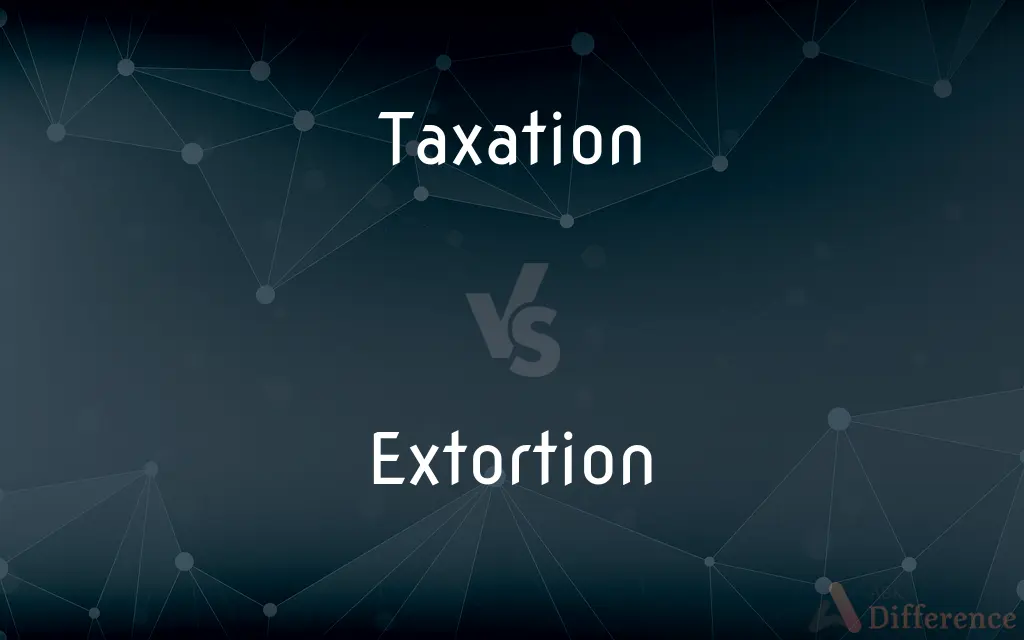Taxation vs. Extortion — What's the Difference?
By Fiza Rafique & Maham Liaqat — Updated on April 16, 2024
Taxation is a legal obligation where government imposes charges on citizens for public services, whereas extortion involves coercing money by threats, outside the law.

Difference Between Taxation and Extortion
Table of Contents
ADVERTISEMENT
Key Differences
Taxation is a system implemented by governments to fund public services and infrastructure. It is mandated by law and applies uniformly to individuals and businesses according to defined rules. Whereas, extortion is an illegal act where individuals or groups force someone to pay money through threats or coercion, often violating the victim's rights.
In taxation, the amount payable is determined by legislation and is based on factors like income, property value, or consumption. Compliance is enforced by legal frameworks, and failure to pay taxes can result in legal penalties. On the other hand, extortion amounts are not based on any lawful criteria and often involve threats of violence, reputation damage, or other harmful consequences if the demand is not met.
The ethical framework surrounding taxation views it as a necessary contribution to society, supporting common goods like roads, schools, and healthcare. While, extortion is universally condemned as a criminal behavior that undermines the rule of law and individual security.
Governments utilize taxes to redistribute wealth and provide services that aim for economic stability and social welfare. Extortion, however, benefits only the perpetrators and is aimed purely at personal gain, often resulting in economic and psychological harm to the victims.
Public perception of taxation can vary, ranging from a civic duty to a burdensome obligation, depending on the perceived fairness and use of the tax revenue. Extortion, conversely, is consistently regarded as unjust and predatory, eliciting fear and anger from those affected.
ADVERTISEMENT
Comparison Chart
Legality
Legal and mandated by government laws.
Illegal and considered a criminal act.
Purpose
To fund public services and infrastructure.
To unlawfully gain money or favors through coercion.
Basis of Amount
Determined by statutory criteria like income, property, sales.
Determined by the perpetrator, often with no rational basis.
Societal Impact
Aims for positive societal impacts like welfare and development.
Negative impact, causing loss and trauma to individuals.
Public Perception
Viewed as a civic duty or necessary burden.
Universally condemned as unjust and harmful.
Compare with Definitions
Taxation
A mandatory contribution to state revenue, levied by the government on workers' income and business profits.
Taxation on her salary funds federal infrastructure and social programs.
Extortion
Using one’s position or powers to gain money or favors.
Extortion within political offices can undermine public trust.
Taxation
A financial charge imposed by a government on personal or corporate assets.
Annual property taxation is part of his home ownership expenses.
Extortion
Obtaining something through force or threats.
Extortion by local gangs hampers community businesses.
Taxation
Taxes collected on goods and services at the point of sale.
Sales taxation is added at the checkout counter.
Extortion
A criminal offense where individuals unlawfully demand money, property, or services.
Extortion was used to coerce money from the small shop owners.
Taxation
Tax evasion is the illegal avoidance of taxes by individuals or corporations.
Companies caught in tax evasion face severe penalties.
Extortion
Blackmail, a form of extortion involving information misuse.
Blackmail involved extortion by threatening to reveal private information.
Taxation
Progressive taxation involves higher rates for higher income brackets.
His increase in salary moved him into a higher taxation bracket.
Extortion
Coercive collection of payments with threats of harm or violence.
He faced extortion when threats were made against his family.
Taxation
The levying of tax
The progressive nature of taxation
A taxation system
Extortion
Extortion is the practice of obtaining benefit through coercion. In most jurisdictions it is likely to constitute a criminal offense; the bulk of this article deals with such cases.
Taxation
The act or practice of imposing taxes.
Extortion
The practice of obtaining something, especially money, through force or threats
He used bribery and extortion to build himself a huge, art-stuffed mansion
Extortion rackets
Taxation
The fact of being taxed.
Extortion
Illegal use of one's official position or powers to obtain property, funds, or patronage.
Taxation
An assessed amount of tax.
Extortion
The act or an instance of extorting something, as by psychological pressure.
Taxation
Revenue gained from taxes.
Extortion
An excessive or exorbitant charge.
Taxation
The act of imposing taxes and the fact of being taxed.
Extortion
The practice of extorting money or other property by the use of force or threats.
Taxation
A particular system of taxing people or companies
Extortion
The act of extorting; the act or practice of wresting anything from a person by force, by threats, or by any undue exercise of power; undue exaction; overcharge.
Taxation
The revenue gained from taxes
Extortion
The offense committed by an officer who corruptly claims and takes, as his fee, money, or other thing of value, that is not due, or more than is due, or before it is due.
Taxation
The act of laying a tax, or of imposing taxes, as on the subjects of a state, by government, or on the members of a corporation or company, by the proper authority; the raising of revenue; also, a system of raising revenue.
Extortion
That which is extorted or exacted by force.
Taxation
The act of taxing, or assessing a bill of cost.
Extortion
An exorbitant charge
Taxation
Tax; sum imposed.
Extortion
Unjust exaction (as by the misuse of authority);
The extortion by dishonest officials of fees for performing their sworn duty
Taxation
Charge; accusation.
Extortion
The felonious act of extorting money (as by threats of violence)
Taxation
Charge against a citizen's person or property or activity for the support of government
Taxation
Government income due to taxation
Taxation
The imposition of taxes; the practice of the government in levying taxes on the subjects of a state
Common Curiosities
What are the consequences of not paying taxes compared to not complying with extortion?
Not paying taxes can lead to legal penalties or fines, while not complying with extortion threats can result in personal or property harm.
Is there any similarity between taxation and extortion?
Both involve the transfer of money or resources from one party to another, but their legality, purpose, and societal acceptance vastly differ.
Can both taxation and extortion be resisted legally?
Individuals can legally challenge or appeal taxation; however, resisting extortion involves law enforcement due to its illegal nature.
How does the public generally view taxation and extortion?
Taxation is viewed variably as necessary or burdensome, while extortion is universally viewed negatively.
What is the main legal difference between taxation and extortion?
Taxation is legally mandated and enforced by governments, whereas extortion is an illegal act of coercion.
How do societal impacts of taxation and extortion differ?
Taxation generally benefits society by funding public services, whereas extortion damages society by harming individuals and undermining the law.
How does the purpose of taxation differ from that of extortion?
Taxation funds public and governmental services, while extortion is aimed at personal gain through illegal means.
What role does government play in both taxation and extortion?
Government enforces taxation lawfully while it fights against extortion by enforcing criminal law.
What historical examples illustrate the effects of taxation and extortion?
Historical taxation like the Boston Tea Party highlighted resistance to unfair taxes, while cases like mafia extortion schemes show the destructive impact of extortion.
How are the amounts determined in taxation and extortion?
Taxation is based on laws and predefined criteria, while extortion amounts are arbitrarily set by the extortionist.
What drives people to commit extortion?
Extortion is driven by the desire for illegal personal gain, often accompanied by threats or coercion.
What legal protections are there against extortion?
Extortion is a criminal offense and is punishable by law, with victims protected under criminal justice statutes.
How do victims respond to extortion compared to taxation?
Victims of extortion often feel threatened and seek help from law enforcement, whereas taxpayers may seek legal recourse or compliance.
Can taxation ever be considered extortion?
While some may subjectively feel that taxation is coercive, legally it is not extortion as it is a government-mandated obligation.
Can extortion ever have a legitimate purpose like taxation?
No, extortion is purely for illegal personal gain and lacks any legitimate societal benefit.
Share Your Discovery

Previous Comparison
Abjad vs. Alphabet
Next Comparison
Pack vs. UnitAuthor Spotlight
Written by
Fiza RafiqueFiza Rafique is a skilled content writer at AskDifference.com, where she meticulously refines and enhances written pieces. Drawing from her vast editorial expertise, Fiza ensures clarity, accuracy, and precision in every article. Passionate about language, she continually seeks to elevate the quality of content for readers worldwide.
Co-written by
Maham Liaqat













































